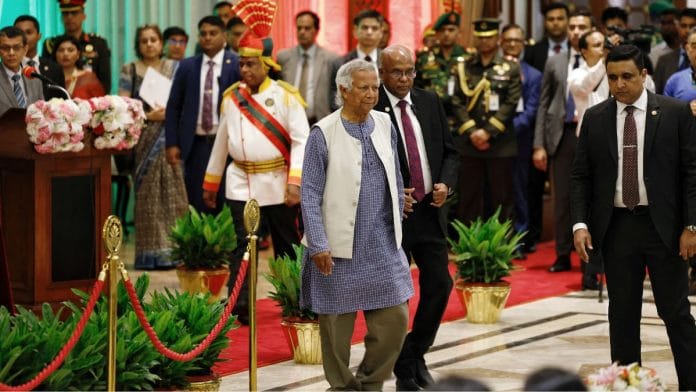New Delhi: Bangladesh’s new interim government, led by Nobel laureate Muhammed Yunus, consists of a mixed bag of civil society representatives, environmentalists, former bureaucrats, and two prominent faces of the student movement which led to former prime minister Sheikh Hasina’s ouster. Only seven visibly lean towards the Bangladesh Nationalist Party (BNP) or Jamaat-e-Islami party.
The 17-member advisory council took oath Thursday night in the presence of foreign diplomats, businessmen, politicians and others at the presidential palace in Dhaka. India’s High Commissioner in Dhaka was also in attendance.
The composition of the council appears to have satisfied the demands of student protestors. Nahid Islam and Asif Mahmud, two key organisers of the agitation, were also sworn in.
“My best wishes to Professor Muhammad Yunus on the assumption of his new responsibilities,” said Prime Minister Narendra Modi in a statement on X.
“We hope for an early return to normalcy, ensuring the safety and protection of Hindus and all other minority communities. India remains committed to working with Bangladesh to fulfil the shared aspirations of both our peoples for peace, security and development,” he added.
My best wishes to Professor Muhammad Yunus on the assumption of his new responsibilities. We hope for an early return to normalcy, ensuring the safety and protection of Hindus and all other minority communities. India remains committed to working with Bangladesh to fulfill the…
— Narendra Modi (@narendramodi) August 8, 2024
Ahead of the oath-taking ceremony, a one-minute silence was observed to pay respect to over 300 people killed in the violent week-long protests that began as anti-quota protests and quickly snowballed into anti-establishment protests.
Yunus aside, a majority of the advisory council are either former bureaucrats, activists or members of civil society.
According to Sreeradha Datta, professor at the Jindal School of International Affairs, O.P. Jindal Global University, the new government is a “transparent, apolitical” group of mainly civil society representatives.
“It’s a good mix of retired bureaucrats, civil society representation and others. They are not seen as loyalists to any political dispensation,” she said.
However, other experts are slightly sceptical.
“On the face of it, most of the new faces are from civil society and NGOs. But just because they are not formerly part of any party, does not mean they don’t have political leanings or sympathise with a certain political cause. Let’s see how they will restore law and order,” Smruti S. Pattanaik, research fellow covering South Asia at Manohar Parrikar Institute for Defence Studies and Analyses (IDSA) told ThePrint.
It is also likely that the new interim government will rule far beyond the constitutionally-mandated three-month period.
ThePrint explains the composition of the new government in Bangladesh.
Jamaat-leaning
Brigadier General (Retd) M. Sakhawat Hossain is a former election commissioner, who once called Hasina a “classic autocrat”. He was also vocal about the mishandling of the recent student protests in which many died. He told BBC, “Police were exhausted. We heard that they didn’t have adequate ammunition”.
A.F.M. Khalid Hossain is an Islamic scholar and former vice-president of Hefazat-e-Islam Bangladesh, a far-right conservative-islamic advocacy group.
Farooq-e-Azam is a retired naval commando and freedom fighter. He is a Bir Pratik awardee, the fourth highest gallantry award in Bangladesh.
BNP-leaning
Dr Md Nazrul Islam (Asif Nazrul) is a law professor, researcher and activist. He is believed to have represented the BNP, when the Bangladesh Army chief General Waker-Uz-Zaman held a meeting Monday with various political parties before announcing Hasina’s resignation.
Adilur Rahman Khan was previously appointed as Deputy Attorney General by the Bangladesh Nationalist Party-Jamaat-e-Islami government. He is a law professor, researcher and civil society activist. Last September, he was convicted for spreading false information about an operation against Hefazat-e-Islam members in Dhaka a decade ago. The Awami League government, at the time of the conviction, had sharply condemned him.
AF Hassan Ariff was the law adviser (cabinet minister) of the caretaker government of Bangladesh from 2008 to 2009. He retired right before the Awami League came into power in 2009. Ariff also served as the Attorney General from 2001 to 2005 during the rule of the BNP-led government.
Touhid Hossain was the foreign secretary from 2006 to 2009. His tenure overlapped with both the caretaker government following the mid-2000s political crisis and the Hasina government that followed.
Ex-bureaucrats, civil society members
Former bureaucrats in the advisory council include Dr Salehuddin Ahmed, the ninth governor of the Bangladesh Bank from 2005 to 2009, and Supradip Chakma, a former ambassador and Chittagong Development Board’s chairman.
Civil society representatives include attorney and environmentalist Syeda Rizwana Hasan, women’s rights activist and agriculture researcher Farida Akhter, head of a local election observer group Sharmeen Murshid, and Bidhan Ranjan Roy, Director of the National Institute of Mental Health.
Nurjahan Begum is viewed as a close associate of Yunus, having served as the former Managing Director of Grameen Bank — the Nobel laureate’s brainchild. In 2012, when the Sheikh Hasina-led government began cracking down on Grameen Bank and had removed Yunus as its head, Begum spoke to The New York Times in defence of the bank’s board.
“Our board members are not very well educated. But they’re intelligent and they have experience with poverty,” Begum told the newspaper, a year after a government panel had found the board “ill-equipped”.
(Edited by Mannat Chugh)
Also Read: India says ‘closely analysing’ Bangladesh crisis, including possibility of ‘foreign hand’






